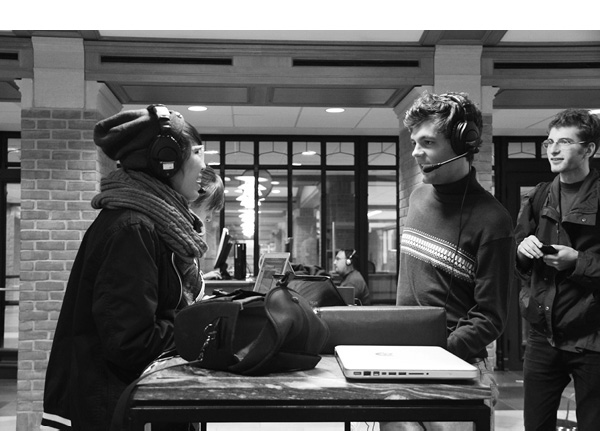
SONIC INTERVENTIONS
first performed on October 20, 2013
the Bass Café at Yale University, New Haven, CT
performed three times in 2013
WYBC YALE RADIO / MARC DEWITT
New Haven, CT / Madrid, Spain
060169900m060169900d060169900e060169900w060169900i060169900t060169900t06016990020601699001060169900@060169900g060169900m060169900a060169900i060169900l060169900.060169900c060169900o060169900m
wybc.com/shows/sonic-meditations
SONIC INTERVENTIONS
WYBC YALE RADIO / MARC DEWITT
Throughout midterm week, I occupied Bass Café with a mobile broadcasting system in order to perform the “Sonic Intervention” series—live radio show interruptions of hyper-productive college campus activity. The café is the only indoor place at Yale designed for public use, and as such operates as a hub for extracurricular meetings, study groups and on-the-go cheap coffee, giving the underground windowless marble box a decided air of professional anxiety and tiresome functionality. I pinned up posters announcing “The sonic intervention is a soft insurrection” and began reciting a poem over ambient music. For several hours, I invited stressed-out students, library staff, bored security guards and anyone passing by into my small sanctuary space of curated generosity. Conversations would drift leisurely from our studies to childhood memory to art and politics, with other students tuning in to the online broadcast and participating in the chatroom.
At Yale, over 50% of students attend mental health services, and I therein find urgency in crafting performance with healing power. Bifo Berardi writes, “As semiocapitalism is based on the constant exploitation of mental energy, and competition is the general form of relation in the sphere of labor precariousness, in the last thirty years—the years of transition—mental suffering has become a social epidemic.” With the “Sonic Intervention” series, I sought to cultivate a space for tender and compassionate connection as a form of resistance to the desensibilization of accelerated and accumulative activity. As an occupation of the central gathering place on campus, the radio show subverted the temporal and spatial dimensions of semiocapitalist productivity, mirroring the autonomous resistance encampments that characterize contemporary struggle: Zuccotti Park in New York City, Puerta del Sol in Madrid, and Tahrir Square in Cairo.
The show confronted a college culture dictated by the maximal ideology of individual utilitarian desire. It fostered, albeit briefly, a space for students to find the peace to listen to themselves and to listen to others in the most anxiety-ridden week of the semester. In this curated sonic warmth, the show sought to break from the mass personalization of campus experience and cultivate collectivity through slowness and sensibility. The sonic intervention is a soft insurrection.